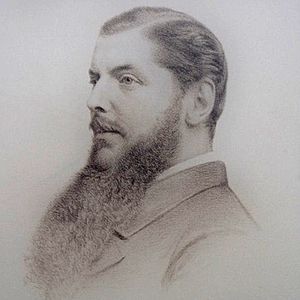William Copeland Borlase facts for kids
Quick facts for kids
William Copeland Borlase
|
|
|---|---|

Photograph of Borlase, c. 1880
|
|
| Member of Parliament for St Austell | |
| In office 1885–1887 |
|
| Preceded by | New constituency |
| Succeeded by | William Alexander McArthur |
| Member of Parliament for East Cornwall | |
| In office 1880–1885 |
|
| Preceded by | Sir Colman Rashleigh John Tremayne |
| Succeeded by | Constituency abolished |
| Personal details | |
| Born | 5 April 1848 Castle Horneck, Penzance, Cornwall |
| Died | 31 March 1899 (aged 50) Bloomsbury, London |
| Resting place | Highgate Cemetery (east) |
| Nationality | British |
| Spouse | Alice Lucy Kent |
| Parents | Samuel Borlase Mary Anne Copeland Borlase |
| Relatives | William Borlase |
| Residences | Laregan, Penzance |
| Alma mater | Winchester College Trinity College, Oxford |
| Occupation | Antiquarian and politician |
William Copeland Borlase (born April 5, 1848 – died March 31, 1899) was a British expert in ancient things (an antiquarian) and a politician from the Liberal Party. He was a member of the House of Commons, which is like a main part of the UK government. He served from 1880 until 1887, when he faced financial problems and left his political role.
Contents
Early Life and Discoveries
William Copeland Borlase was born on April 5, 1848. His birthplace was Castle Horneck, which is near Penzance in Cornwall, England. He was the only son of Samuel Borlase and Mary Anne Borlase.
William came from a rich family in Cornwall. His great-great-grandfather, Dr. William Borlase, was a famous historian of Cornwall. This ancestor's work on old sites really influenced young William.
Exploring Ancient Sites
As a young person, William visited many ancient places in Cornwall. In 1863, he helped manage the digging up of an old settlement. This included a fogou, which is an underground passage from prehistoric times. This site was at Carn Euny.
William made many drawings of his discoveries. He also asked another expert, John Thomas Blight, to create detailed pictures for his reports.
Education
William Copeland Borlase went to Winchester College for his schooling. After that, he studied at Trinity College, Oxford, which is a well-known university.
Political Career
In 1882, William became a lawyer at Inner Temple. He also served as a Justice of the Peace for Cornwall. This meant he helped keep law and order in the area. He was also a Deputy Warden of the Stannaries of Cornwall and Devon. This was an important role related to tin mining in the region.
Becoming a Member of Parliament
In the 1880 general election, William was chosen to be a Liberal Member of Parliament (MP). He represented the area of East Cornwall. He held this seat until 1885, when the voting areas were changed.
In the 1885 general election, he was elected again. This time, he became the MP for St Austell. In 1886, he was given a special job as the Parliamentary Secretary to the Local Government Board.
Financial Difficulties
William enjoyed a fancy lifestyle. However, he started to have serious money problems and debts. Because of these financial issues, he had to leave his position in the House of Commons. He resigned on April 29, 1887.
His home in Laregan was sold at an auction on May 17, 1887. After this, he left England. He worked in Ireland and also managed tin mines in Spain and Portugal. His family did not support him after his financial troubles.
Later Life and Death
William Copeland Borlase passed away on March 31, 1899. He was 50 years old. At the time of his death, he was living in Bloomsbury, London. He was buried in the east side of Highgate Cemetery.
Images for kids
-
Chun Quoit, Morvah (drawing from Naenia Cornubiae, 1872)
 | George Robert Carruthers |
 | Patricia Bath |
 | Jan Ernst Matzeliger |
 | Alexander Miles |


